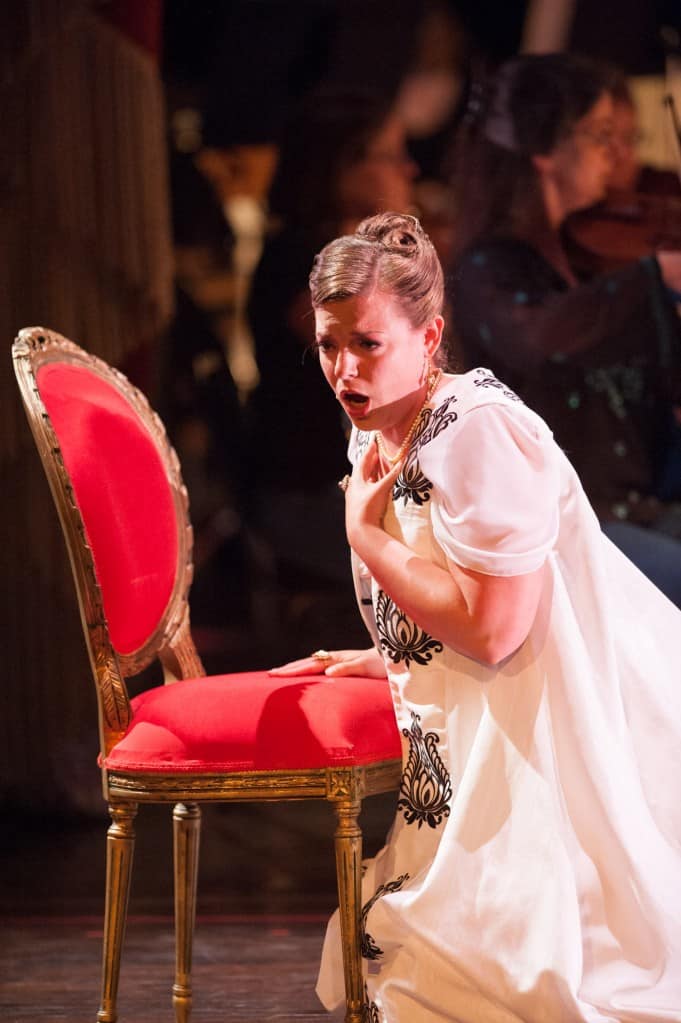If you aren’t an opera buff, this summer’s Merola events are a great place to start. Ever since last summer when the Merolini offered up a youthful, sly, comedic, tongue-in-cheek performance of “Il barbiere di Siviglia,” This operatic program may be less well known than Harvard, but it’s roughly twice as competitive. year’s 29 Merolini were selected from approximately 900 applicants. Their 3.2% acceptance rate is just under half of that for Harvard’s undergraduate class of 2016 (5.9%).
These numbers are entirely beside the point, however as they don’t speak to the magic of a Merola season.
This year’s season was kicked off with the Schwabacher Summer Concert. Instead of a single operatic work, the carefully crafted program included individual scenes from works by Gaetano Donizetti (Anna Bolena, 1830), Arrigo Boïto (Mefistofele, 1868), George Bizet (La Jolie Fille de Perth, 1867), and Igor Stravinsky (The Rake’s Progress, 1951).
These seemingly disparate works span 182 years, but all capture similar themes of love and death. The intense focus upon the moment when fateful decisions are made gives the program both urgency and unity.
The program opened with a scene from “Anna Bolena.” We see Boleyn (Melinda Whittington) mourning her fate in the Tower of London. Her first notes blow the audience away with their intensity and power. She is surprised by an unexpected guest (Erin Johnson), who is so taken by Boleyn’s plight that she reveals she is none other than the Lady Seymour, Boleyn’s successor wife. The moment turns as both women realize their commonality and their relative powerlessness.
Two scenes from Boïto’s Mefistofele follow; first we see Mefistofele (Andrew Kroes) tempt Faust (Chuanyue Wang) into sealing the demonic pact. Wang’s stunning theatrical performance, in which every muscle on his face takes on meaning, is topped only by his operatic performance. His tenor was perfectly matched against Kroes’ bass, which completed his perfectly demonic leer.
MORE SF CULTURE & ARTS: Review: Heartbreak of ‘The Scottsboro Boys’ paves way for celebration
Baldwin and Wang wrung every possible nuance from the scene, leaving Baldwin to die victorious, and the audience to look stunned in emotional exhaustion.
This scene is topped only by the “Death of Margherita,” which appears later in Act III. Here, Kroes’ Mefistofele takes a back seat to the primary action between the compromised Faustus and the doomed Margherita, played by Elizabeth Baldwin. Baldwin and Wang wrung every possible nuance from the scene, leaving Baldwin to die victorious, and the audience to look stunned in emotional exhaustion.
The second half of the program began with Bizet’s “La Jolie Fille de Perth.” The meandering harp playing under a flute that opened up this piece signaled a distinct change from the heavier material preceding it. The seven Merolini engaged in this piece included Hadleigh Adams as Ralph, along with Andrew Kroes and Melinda Whittington, as Le Majordomo and Catherine Glover, respectively. At first blush, this light comedic piece seemed an odd addition. However, upon reflection, it too turns on a decisive moment in which vengeance is extracted for betrayal. Hadleigh’s performance as the drunken Ralph was perfectly measured. Amazingly, his athletic vocal pyrotechnics were not at all at odds with his inebriated swagger across the stage.
The action returned to selling one’s soul to the devil (and the consequences thereof) in Stravinsky’s “Rake’s Progress,” which closed the evening. In this scene, Tom Rakewell (played by Joshua Baum) suffers the consequences of selling his soul to the demonic Nick Shadow (played by Seth Mease Carico).
If you missed this concert, there’s no need to fret. The summer will be packed with more Merola events The next will be on July 19th, when the group presents “Postcard from Morocco.”



